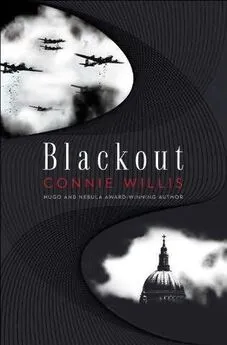Connie Willis - Blackout
- Название:Blackout
- Автор:
- Жанр:
- Издательство:неизвестно
- Год:неизвестен
- ISBN:нет данных
- Рейтинг:
- Избранное:Добавить в избранное
-
Отзывы:
-
Ваша оценка:
Connie Willis - Blackout краткое содержание
In her first novel since 2002, Nebula and Hugo award-winning author Connie Willis returns with a stunning, enormously entertaining novel of time travel, war, and the deeds—great and small—of ordinary people who shape history. In the hands of this acclaimed storyteller, the past and future collide—and the result is at once intriguing, elusive, and frightening.
Oxford in 2060 is a chaotic place. Scores of time-traveling historians are being sent into the past, to destinations including the American Civil War and the attack on the World Trade Center. Michael Davies is prepping to go to Pearl Harbor. Merope Ward is coping with a bunch of bratty 1940 evacuees and trying to talk her thesis adviser, Mr. Dunworthy, into letting her go to VE Day. Polly Churchill’s next assignment will be as a shopgirl in the middle of London’s Blitz. And seventeen-year-old Colin Templer, who has a major crush on Polly, is determined to go to the Crusades so that he can “catch up” to her in age.
But now the time-travel lab is suddenly canceling assignments for no apparent reason and switching around everyone’s schedules. And when Michael, Merope, and Polly finally get to World War II, things just get worse. For there they face air raids, blackouts, unexploded bombs, dive-bombing Stukas, rationing, shrapnel, V-1s, and two of the most incorrigible children in all of history—to say nothing of a growing feeling that not only their assignments but the war and history itself are spiraling out of control.
Blackout - читать онлайн бесплатно полную версию (весь текст целиком)
Интервал:
Закладка:
Eileen couldn’t tell Una she was just leaving, not when she’d supposedly packed and departed instantly after reading her sister’s letter, too distraught to let anyone know. She’d have to go see what Lady Caroline wanted. It’s probably another set of louse-y bed wetters, she thought, changing back into her uniform and hurrying along the corridor. Or she’s decided the staff should learn to operate an anti-aircraft gun. Well, whatever it was, she wouldn’t have to do it after today. She’d never have to stand there again with her hands folded and her eyes demurely down, taking orders and saying, “You asked for me, ma’am?”
“You asked for me, ma’am?” she said.
“Yes,” Lady Caroline said grimly. “Miss Fuller came to see me just now. While she was at the Women’s Institute meeting yesterday, someone stole the hood ornament and the door handles off her Daimler.”
“Does she know who it was?” Eileen asked, even though she already knew the answer.
“Yes. She saw one of the culprits running away with them. It was Alf Hodbin. This sort of disgraceful behavior cannot be allowed to continue. Heaven knows, I am eager to do my bit, as it were, but I cannot have criminals at the manor.”
“I’ll see to it Alf returns them,” Eileen lied. “Will that be all, ma’am?”
“No. The billeting officer, Mrs. Chambers, is coming this afternoon. She’s bringing three more children. Two of them were originally to be sent to Canada, but their parents decided the North Atlantic was too dangerous.”
It is, Eileen said silently, thinking of the City of Benares, which would be torpedoed and go down with four hundred evacuees aboard in September.
“Mrs. Chambers assures me they’re extremely well-behaved children,” Lady Caroline said. Eileen doubted that, and even if they were, three days in the company of Alf and Binnie could turn an angel into a hookey-playing, stone-throwing, distributor-stealing hooligan.
“You’ll need to prepare cots for the children,” Lady Caroline said. “I shan’t be here this afternoon. Mrs. Fitzhugh-Smythe and I have a Home Defence meeting in Nuneaton, so you will need to fill up the paperwork for Mrs. Chambers when she arrives. She’ll be here at three.”
And this is the last time you can make me do something on my half-day out, Eileen thought. “Yes, ma’am. Will there be anything else?”
“Tell Mrs. Chambers I’m sorry I wasn’t able to be here,” she said, pulling on her gloves. “Oh, and after you have the children settled, this cotton lint needs to be torn into strips and rolled for bandages. I promised they’d be done for my St. John’s Ambulance meeting tomorrow. And tell Samuels to have the car brought round.” She picked up her bag. “You may go.”
That is just what I intend to do, Eileen thought, running down to tell Samuels and then pelting back up to her room. But before she could even get her uniform unbuttoned, Una appeared to tell her that Mrs. Chambers was downstairs with three children.
“There must be some mistake,” Una said, nearly in tears. “They can’t be for here, can they?”
“Unfortunately, yes. Has her ladyship gone?”
Una nodded. “What will we do with more children?” she wailed. “We already have so many!”
And Una would never be able to manage the billeting forms. Eileen glanced at her watch. Half past two. The children wouldn’t be home from school for another hour. I’m already leaving her and Mrs. Bascombe in the lurch, Eileen thought. At least I can get the new evacuees settled before I leave. “Go make up three more cots in the nursery,” she said, “and I’ll go and speak with her. Where are they?”
“In the morning room. How will we manage thirty-two children with only the three of us?”
The two of you, Eileen corrected, hastening down to the morning room. Lady Caroline would simply have to exert herself and find a new maid. Or pitch in and do that bit for the war effort she was always talking about. She opened the door to the morning room. “Mrs. Chambers, her ladyship asked me to-”
Theodore Willett was standing there with his suitcase. “I want to go home,” he said.
He has missed the bus.
-NEVILLE CHAMBERLAIN, REFERRING TO HITLER, 5 APRIL 1940Saltram-on-Sea-29 May 1940
MIKE STARED AT THE GIRL. “WHAT DID YOU SAY?” HE asked. He had to have heard her wrong.
“I said, the bus came yesterday. It comes on Tuesdays and Fridays.”
Which meant today was Wednesday the twenty-ninth, and he’d already missed three days of the evacuation.
“It used to be every day,” she said, “but since the war-”
“But Friday’s the thirty-first,” Mike exploded. “There has to be a bus before then.” The entire British Army would have been evacuated by then. He’d have missed the whole thing. “What about Ramsgate? When’s the next bus that goes there?”
“I’m afraid that’s Friday, as well,” the girl said. “It’s the same bus, you see.” She’d retreated warily up a step, and he realized he’d been yelling.
“I’m sorry,” Mike said. “It’s just that I was supposed to be in Dover this afternoon to cover a story, and now I don’t know how I’m going to get there. How far’s the nearest train-I mean, railway-station?” If there was one in the next village, maybe he could walk to it.
“Eight miles,” Daphne said, “but there haven’t been any passenger trains from there since the start of the war.”
Of course. “What about a car? Is there one in the village I could rent-I mean, hire? Or someone I could pay to drive me into Dover? I could pay-” Oh, Christ, what was the going rate for renting a car in 1940? “Three pounds.”
“Three pounds?” Her eyes widened. “I always heard Yanks were rich.”
Which meant that was way too much. “I’m not rich. It’s just really important I get there today.”
“Oh. Mr. Powney might be able to take you in his lorry,” she suggested, “but I don’t know if he’s back yet.”
“Back?”
“He went to Hawkhurst yesterday to buy a bull,” she explained. “He may have decided to stay over. He hates driving in the blackout. I’ll ask Dad. Back in a moment.” She ran back up the stairs, glancing flirtatiously over her shoulder at him as she went. “Dad?” he heard her say. “Is Mr. Powney back from Hawkhurst yet?”
“No. Who’s that you’re talking to, Daphne?”
“A Yank. He’s a reporter.”
Mike couldn’t hear the rest of the conversation. After a minute, Daphne ran back down the stairs. “Dad says he’s not back, but he should be sometime this morning.”
“And there’s no one else here with a truck-I mean, a lorry? Or an automobile?”
“Dr. Grainger has one, but he’s not here either. He’s visiting his sister in Norwich, and the vicar donated the tires on his to the rubber drive. And what with the petrol rationing, I-oh, here’s Miss Fintworth,” she said as a thin, frowsy-haired woman came in. “Our postmistress. Perhaps she’ll know when Mr. Powney’s coming back.”
She didn’t. “Would you give this to him when he arrives?” she asked, handing Daphne a letter. Daphne stuck it with several others behind the bar, and Miss Fintworth went out, brushing past a toothless old man on his way in.
“Mr. Tompkins will know,” Daphne said. “Mr. Tompkins,” she called to him, “do you know when Mr. Powney’s coming back?”
Mr. Tompkins muttered something Mike couldn’t make out at all, but Daphne apparently understood it. “He says Mr. Powney told him he planned to start back as soon as it was light. So he should be here by nine or half past.”
Nine-thirty, and then it would take them at least two hours to drive to Dover, which would put him there by noon. If Powney didn’t have to put his new bull away first or milk the cows or feed the chickens or something.
“Here, I’ll make you a nice cup of tea while you wait,” Daphne said, “and you can tell me all about the States. You said you were from Omaha? That’s in Ohio, isn’t it?”
“Nebraska,” he said absently, trying to decide whether he should walk north of the village and try to hitch a ride or whether he was better off waiting here.
“That’s in the Wild West, isn’t it?” Daphne asked. “Are there red Indians there?”
Red Indians? “Not anymore,” he said. “How many-?”
“Do you know any gangsters?”
She was clearly not an historian. “Nope, sorry. How many vehicles go through here in a day, Daphne?”
“A day?”
“Never mind,” he said. “I will have that cup of tea.”
“Oh, good. You can tell me all about-where did you say you were from? Nebraska?”
Yes, but thanks to Dunworthy changing my schedule, I didn’t have time to research it, so I don’t know anything about it. It was obvious Daphne didn’t either, but he’d still better avoid the subject. “Why don’t you tell me about the village instead?”
“I’m afraid there’s nothing to tell. Scarcely anything happens in this part of the world.”
Less than fifty miles from here the British and French armies were being pushed into a desperate corner by the Germans, a makeshift armada was being organized to go rescue them, and the outcome of the entire war depended on whether that rescue was successful or not, and she didn’t know anything about it. He guessed he shouldn’t be surprised. The news of it had been kept out of the papers till the evacuation was nearly over, and the only contemps who’d known about it were those who’d seen Dunkirk’s smoke on the horizon or the trains full of wounded and exhausted soldiers arriving home.
And Saltram-on-Sea didn’t have a train station. But it did have boats, and Mike was surprised the Small Vessels Pool hadn’t been here. Its officers had driven up and down the Channel coast commandeering fishing boats and yachts and motor launches and their crews to go pick up the stranded soldiers.
“I suppose you’ve been in lots of exciting places,” Daphne said, setting a cup of tea in front of him. “And seen lots of the war. Is that why you need to get to Dover? Because of the war?”
“Yes. I’m writing a story for my paper on invasion preparations along the coast. How has Saltram-on-Sea prepared?”
“Prepared? I don’t know… we’ve the Home Guard…”
“What do they do? Patrol the beaches at night?”
“No. Mostly they practice drilling.” She dropped her voice to a whisper. “And sit in here bragging about what they did in the last war.”
So whatever had kept the drop from opening last night, it hadn’t been the Home Guard. “Do you have any coastwatchers?”
“Dr. Grainger.” Who was in Norwich, visiting his sister.
Mr. Tompkins piped up from his table with a string of unintelligible syllables. “What did he say?” Mike asked Daphne.
“He said our boys will never let Hitler get to France.”
Yes, well, right now Hitler was in France, had taken Boulogne and Calais, and was about to take Paris.
“Dad says our boys will chase Hitler back to Berlin with his tail between his legs,” Daphne said. “He says we’ll have the war won in two weeks.”
Doesn’t anybody ever see a disaster coming? Mike wondered. This was just like Pearl Harbor. In spite of dozens of clues and warnings, the contemps had been caught completely off guard. They hadn’t seen the World Trade Center coming either, or Jerusalem, or the Pandemic. And at St. Paul’s, the day before a terrorist walked in with a pinpoint bomb under his arm and blew the cathedral and half of London to smithereens, the burning topic had been whether or not it was appropriate to sell Light of the World T-shirts in the gift shop.
Читать дальшеИнтервал:
Закладка:

![Jane_BlackCat - Понять не поздно... [СИ]](/books/1148838/jane-blackcat-ponyat-ne-pozdno-si.webp)
![Jane_BlackCat - За краем Вечности [СИ]](/books/1148839/jane-blackcat-za-kraem-vechnosti-si.webp)

